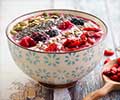Coffee - Mental Performance and Wellness
Coffee when consumed in moderation causes mood elevation and alertness but excess intake leads to anxiety attacks and insomnia.
The essential component of coffee, the caffeine, is a psychoactive chemical substance that excites the nervous system and is grouped under ‘stimulants’. Caffeine is not a ‘depressant’ such as alcohol or low dose cannabis which slows down the central nervous system. Nor is it hallucinogenic like LSD, magic mushrooms and high dose cannabis which distort how things are perceived. This means, you don’t become ‘addicted’ to caffeine by consuming coffee –it simply stimulates you, and improves your mood.
This is, most probably, what Napoleon Bonaparte meant when he said, “Coffee gives me warmth, waking, an unusual force and a pain that is not without very great pleasure”, during the time when he was imprisoned and exiled to island of St. Helena by the British. Incidentally, St. Helena is known for the great coffee it produces.
Although coffee is primarily enjoyed for its flavor, there are positive effects of coffee on our mental performance and wellness. Most of us have experienced that feeling of alertness and freshness after a good cup of coffee. The morning cup of steaming coffee gives many of us the stimulation to cope with everyday stresses of life.
Not just the decoction, even the aroma of coffee is refreshing and mood elevating. Researchers at the National Institute of Advanced Industrial Science and Technology in Tsukuba, Japan, found that the scent of roasted coffee beans activated important stress-relieving genes in the sleep-deprived stressed experimental rats.
How does coffee aroma activate those stress-relieving genes? Scientists say that coffee aroma affects the brain through ‘gene expression and protein expression’. The coffee aroma stimulates an increased production of glucocorticoids in the brain that help protect against body’s normal reactions to stress giving us a sense of well-being.
On the other hand, prolonged caffeine consumption, say 6 or more cups of coffee per day, can lead to adrenal fatigue associated with chronic stress. Excessive caffeine consumption can also lead to anxiety attacks or panic attacks. This has been shown by a British study where the researchers found that caffeine in high dose or caffeine withdrawal can cause anxiety attacks with symptoms such as insomnia, irritability, nausea, and diarrhea.
Studies have also shown that caffeine present in coffee can improve cognitive function (mental performance) of the brain in adults and prevent cognitive decline in older adults. After drinking a cup of coffee, caffeine is absorbed by the digestive system within 45 minutes and its effect lasts for about one and a half hours in the body. This is sufficient time for caffeine to block the adenosine receptors which release neurotransmitters that cause reduced arousal and increased sleep. Blocking adenosine receptors increases the activity of the central nervous system and improves mental alertness.
On the flip side, a study published in the journal Nutrition Bulletin reveals that not much benefit is gained from regular caffeine consumption. This is because caffeine withdrawal lowers alertness and mood and degrades mental performance as well. Consumption of more caffeine can reverse these effects but it does not boost performance to above ‘normal’ levels.
Again, caffeine is an ergogenic aid and many researches have shown that 1-2 cups of coffee can boost performance in endurance exercises. However, a kinesiology study from Belgium found that the effect of oral creatine supplementation (used for enhancing muscle power) is completely eliminated by caffeine intake.
In short, it can be said that coffee gives one a sense of physical, emotional and mental well being only when consumed in moderation. Excessive coffee drinking gives the opposite results in the form of irritability, adrenal fatigue, insomnia, and low mood.


















